Provided by Dandelion Spring Farm and Straw Farm
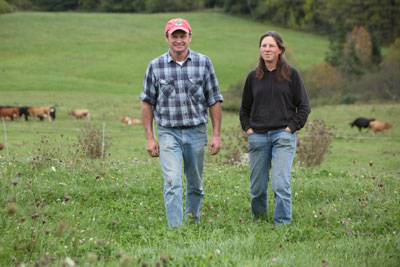 |
| Lee Straw and Beth Schiller produce most of the food their CSA members might eat, at their two businesses located on the same farm in Newcastle, Maine. Photo by Keri Pickett, courtesy of Horizon Organics. |
By Holli Cederholm
Dandelion Spring’s vegetable fields and Straw Farm’s rolling pastures form a checkerboard of organic agriculture on 50 acres in Newcastle, Maine. Beth Schiller of Dandelion Spring Farm and Lee Straw of Straw Farm are partners with independent businesses housed on the same land base. In 2012 they kicked off the inaugural season of their collaborative full-season, full-diet, free-choice Community Supported Agriculture (CSA) program – the first of its kind in Maine.
The Farms
Schiller and Straw had their own established farms and markets before they became a couple. In 2010, when Schiller moved Dandelion Spring from Washington, Maine, to Straw’s land in Newcastle, they decided to continue their businesses as sole proprietorships.
“Straw Farm is a livestock operation with forages for livestock, and Dandelion Spring is the vegetable operation,” says Straw, although Dandelion also produces some meat.
Schiller cultivates 6 acres of certified-organic mixed vegetables, marketing about 50 percent directly at the Rockland and Portland farmers’ markets and via a credit-style CSA; the rest she sells wholesale to restaurants.
Schiller had also been raising sheep for meat and fiber, and pigs for meat and to clear land on the farm she leased before their merger. She continues to raise 20 pigs a year, purchasing 10 piglets in the spring and another round in the fall.
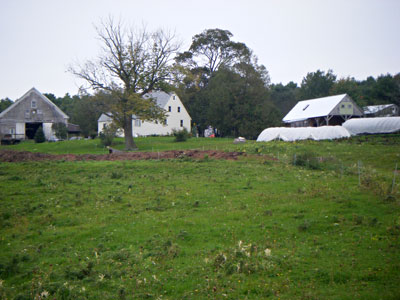 |
| Infrastructure in Newcastle includes three barns: for milking, livestock and hay, and vegetable storage. The farm also has four steel greenhouses and some portable caterpillar tunnels for the vegetable operation. Holli Cederholm photo. |
“Folks at market find pork to be a very accessible meat,” says Schiller. “I also like that apprentices get to see the whole life cycle in one season.”
Her small flock of sheep has been absorbed by Straw’s flock, which is where they came from originally.
Straw shepherds two separate groups of sheep and processes about 200 lambs a year. Each May 100 ewes, which Straw tends for another family, lamb on an island in Penobscot Bay. The “island flock” of North Country Cheviot-type sheep date back over 200 years and have been continually selected on the island. Aside from docking, castrating, shearing and introducing breeding rams, Straw leaves the sheep alone – to eat seaweed and grass and to bed down in a grove of spruce trees.
Another 50 ewes, from Straw’s island breeding program, lamb each March at the Newcastle farm and are then rotationally grazed on the farm as well as on leased pastureland and hayfields, adding up to 250 acres, surrounding Newcastle.
However, cows are the economic center of Straw Farm. Straw runs a MOFGA-certified dairy herd of 40 Jersey and Holstein heifers raised predominantly on pasture. He milks more cows in winter than in summer, as dry cows can be pastured off-farm. Most of the milk is shipped to Horizon, but about 15 percent is bottled raw for local deliveries, including to stores and farmers’ markets. Certified-organic beef is another aspect of this enterprise. The dairy herd and beef cows are the only livestock currently certified as organic on the farm.
Straw also raises approximately 1,000 Red sex-link laying hens, some pastured. Their eggs go to farmers’ markets and the CSA. The rest of the hens are raised indoors, providing eggs for wholesale accounts.
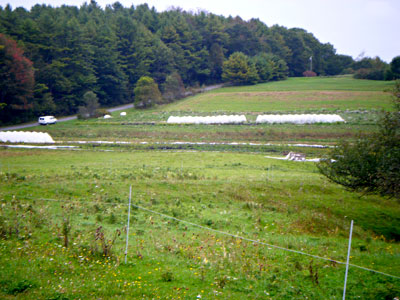 |
| Schiller raises 6 acres of MOFGA certified organic vegetables. Holli Cederholm photo. |
“Ultimately elements of both our farms overlap a lot,” says Straw. He makes compost for the vegetable operation, Schiller’s pigs consume waste milk from Straw’s dairy herd, and the two farmers often share tractors. Of the five apprentices Schiller hosts annually, one works regularly with the animals while the others handle livestock chores minimally each morning.
“Customers are now pretty much overlapping,” Schiller adds. She stocks raw milk and eggs at her market stand, and beef and an expanded offering of mutton and lamb complement the meat selection she has been providing.
Full-Diet CSA
After reading Kristin Kimball’s The Dirty Life – a memoir describing a full-diet 100-member CSA at Essex Farm in upstate New York – the two realized they had the makings of their own synergistic CSA.
“We’ve got everything they’ve got …,” said Straw. “Let’s give it a try.”
Locally produced farm-fresh vegetables, meat, eggs and milk, all provided year-round from the same family farm, would benefit local consumers and better integrate Schiller and Straw’s farms in the surrounding community, while beginning to merge their independent businesses.
Like a traditional produce CSA, their full-diet CSA makes a sampling of its entire harvest throughout the season available to its members. Similar to the credit-style CSA many farmers use at markets, members select their own produce, either at the farm in Newcastle or at the farms’ booth at the Rockland or Portland farmers’ markets. However, Schiller and Straw’s shareholders can take what they need for the week and then some. They’re encouraged to load up for processing so that they preserve the tastes of summer for when winter brings fewer free-choice offerings.
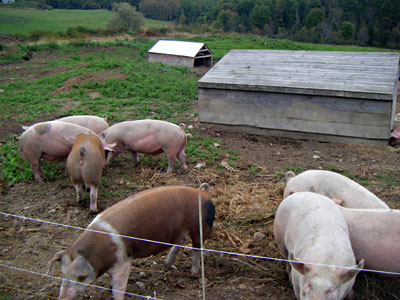 |
| Dandelion Spring and Straw Farm offer their full-diet CSA a wide range of meat options, including pork, beef, lamb and mutton. Holli Cederholm photo. |
Meat, eggs and milk are dispersed similarly. Customers decide whether they want beef, lamb or pork, how much and which cuts. As with produce, shareholders are encouraged to take bulk milk for processing their own yogurt and cheese. Schiller and Straw even offer workshops on canning, fermenting and cheese making to further encourage putting food by.
There are some rules. Sometimes limits are imposed on “firsts” of the season – whether tomatoes or pork tenderloin.
Also, everyone in a household must sign up for a one-year commitment, although Schiller and Straw ask for a seven-month investment and require only a two-month payment to join. In 2012, when the CSA ran for seven months, the first adult cost $2,355, the second, $1,665, children 3 and under are free, and children 4 and over were calculated at a rate of $100 per year of age. For example, a 7-year-old cost $700. In 2013, the CSA will run all year.
These numbers, especially the children’s rates, were influenced by Essex Farm but were ultimately determined by educated guesswork.
“It was quite a process,” says Straw.
Schiller had years of data from her credit-style CSA. In the winter of 2011, she set up a Google Docs form for her CSA pick-up to chart preferences.
“I’m kind of an anal record keeper,” says Schiller.
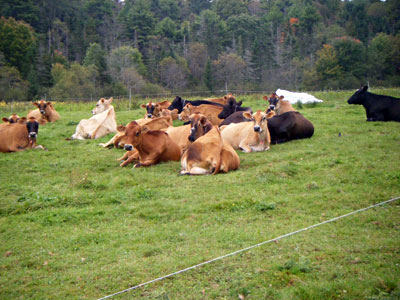 |
| All critters on the farms are maintained by movable electric fence, as different seasons dictate different uses of land. Holli Cederholm photo. |
They determined an average family would consume 2 dozen eggs, 1-1/2 gallons of milk and four cuts of meat per week.
“We broke it down into components and picked averages,” says Schiller.
In the end, it’s a pretty good deal. A one-time joiner fee, including the value of a freezer lamb, a sheep pelt and 12 skeins of yarn, is factored into the first person’s costs. For a couple, this came out to $575 per month for the seven-month share.
Year One and Beyond
“So far it is a successful model in terms of building community and merging businesses,” says Schiller, adding that she liked the sense of freedom when customers came to the farm or farmers’ market booth to collect their shares. “It seemed really natural.”
Seven families participated in their first season, which ran from June through December, with most picking up at farmers’ markets. Schiller and Straw had hoped to attract more families closer to their farm to shift some business more locally and to build community around the farm.
“Still a much broader sense of community [was created] around the farm … it’s such a part of their life,” says Schiller.
On top of the food processing workshops, their farms also hosted on-farm suppers and open houses. Schiller and Straw also strive to educate families that participate in their full-diet CSA – about a different cut of meat or a new vegetable, for instance. “They need to add to their skill set,” says Straw.
Last season the pair calculated shareholders’ eating preferences by tallying their purchases of meat, milk, eggs and vegetables; they’ll continue to do this, to chart costs and to adjust their production.
To keep up with their existing markets and an expanded CSA in 2013, which already has a waiting list, they anticipate changes.
“It’s a dynamic work in progress,” says Schiller.
Schiller ended up limiting her pork sales at farmers’ markets last year as a result of prioritizing CSA members, and is planning to raise 30 to 40 pigs next year. Likewise, Straw will increase his beef production. Schiller will also scale back her vegetable wholesale accounts and transition some of her focus from specialty greens to storage crops.
In reflecting on the upcoming second cycle of the CSA, Schiller also thinks members should almost need a chest freezer. Each week she highlights what is available in large quantities, such as broccoli or chard. “A lot of simple preserving requires freezer space,” says Schiller.
Schiller and Straw are excited about the second year of their farm businesses’ integrated partnership. They agree that they want to embrace the year-round CSA model and are considering other ways their farms can partner, as in making their own biodynamic preparations.
“We have all the components of a true biodynamic cycle,” says Schiller.
“We want to be more intentional in what we do,” says Straw, whether charting energy cycles on the farm or honing their business-minded operations to embrace a smaller-scale consciousness.
Straw recounts a story about a little girl who visited the farm, sampled some raw milk and said, “Mommy, this milk is delicious.”
Straw says, “I never get that from a Horizon customer.”
About the author: Holli Cederholm was MOFGA’s farmer in residence, with Brian St. Laurent. Their Proud Peasant Farm is now located in Washington, Maine.
